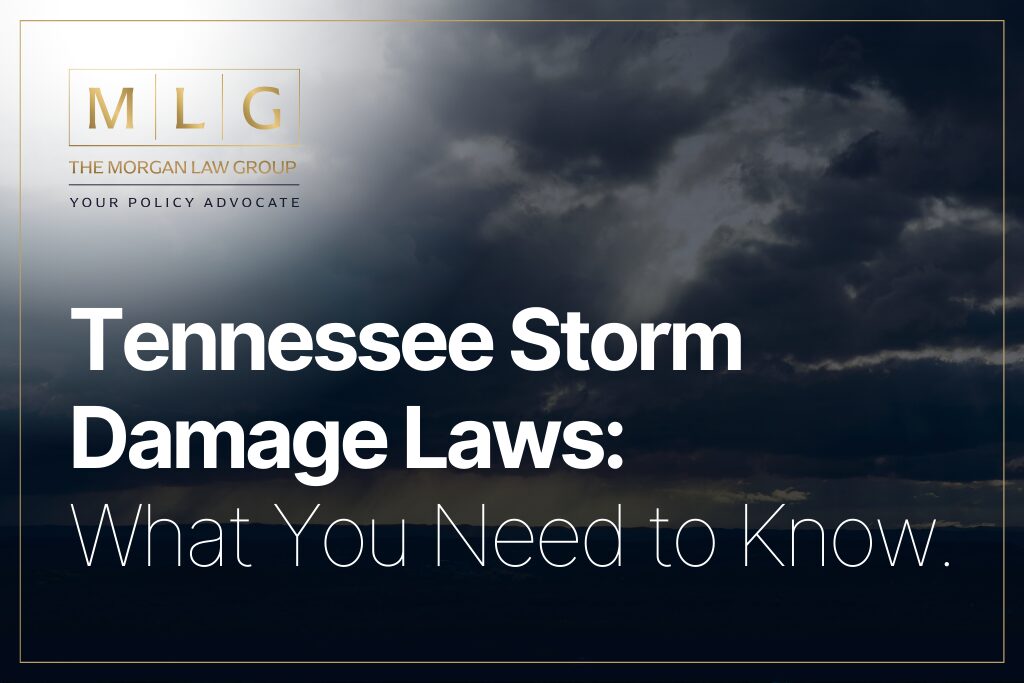The aftermath of a storm in Tennessee can be as challenging as the storm itself, especially when dealing with property damage and insurance claims. Homeowners often find themselves navigating a complex legal landscape to understand their rights and responsibilities.
As Tennessee storm damage attorneys, we assist homeowners and property owners with storm damage insurance claims in Tennessee. This article explores the key aspects of Tennessee storm damage laws, offering insights to those affected by storm damage in TN.
Role Tennessee Department of Commerce and Insurance’s Role
Insurance companies operating in Tennessee are bound by stringent regulations designed to uphold the fair treatment of policyholders, particularly in situations involving storm damage claims. The role of these regulations becomes especially crucial when you are faced with the need to file a Tennessee storm damage insurance claim.
Key among these regulatory bodies is the Tennessee Department of Commerce and Insurance, which plays a central role in overseeing and enforcing these regulations. This oversight ensures that insurance companies adhere to the rules, thereby safeguarding your interests.
Tennessee’s Matching Law
Scope
Tennessee’s matching law (Tenn. Comp. R. & Regs. 0780-01-05-.10), plays a crucial role in shaping how storm damage claims are handled in the state. This legislation’s primary goal is to ensure that repair work on storm-damaged properties adheres to a standard that preserves the property’s uniform appearance. This is not merely a matter of aesthetics; it is about maintaining the overall integrity and functionality of your property. The law acknowledges that inconsistent repairs can compromise both the look and the structural soundness of a property.
Preserving Property Value
An integral component of the matching law is its focus on safeguarding the property’s market value. When storm damage occurs, the law stipulates that it is insufficient for insurance companies to merely repair or replace the affected areas if these do not harmonize with the undamaged parts. It highlights the importance of uniformity in repairs more than just aesthetics; it focuses on preserving your property’s value in the market. The repairs should maintain a consistent look and feel across your property.
Protection Against Depreciation
The matching law also acts as a safeguard against the potential depreciation of your property following storm damage. Inadequate or inconsistent repairs can lead to a decrease in property value, an issue this law addresses head-on. It mandates that insurance companies consider the cumulative effect of the damage and the repairs. This comprehensive approach is designed to prevent disjointed or patchwork repairs that could detract from the overall value and appeal of your property, thereby protecting your investment.
Fair and Equitable Settlements
Furthermore, this legislation is instrumental in guiding insurance companies toward fair and equitable settlements. It necessitates that claims be handled with the stipulations of the matching law in consideration, ensuring that homeowners receive compensation that is not just adequate but reflective of the true scope of their losses and damages. A Tennessee property damage lawyer can ensure that your claim is not only heard but that the settlement you receive is comprehensive and just, truly reflecting the extent and impact of the storm damage on your property.
Statute of Limitation for Storm Damage Claims in Tennessee
When facing property damage due to severe weather in Tennessee, it is crucial to be aware of the legal time constraints for filing a claim. As per Tennessee Code § 28-3-105, there exists a defined statute of limitations – three years – a set period within which any claims for property damage must be filed. This timeframe is a critical aspect of Tennessee storm damage law and plays a pivotal role in the claims process.
The statute of limitations serves as a legal boundary that dictates the urgency with which homeowners must act. Delaying beyond this legal timeframe can have significant consequences. Failing to adhere to this deadline often leads to the forfeiture of the right to seek compensation. It is not just about filing a claim; it is about preserving the right to obtain what is rightfully due for the damages suffered.
This statute of limitations underscores the importance of prompt action following storm damage in TN. As a homeowner, you should prioritize assessing the damage and initiating your Tennessee insurance claim within this period.
Free Consultation With Our Tennessee Storm Damage Insurance Claims Attorneys
Dealing with TN storm damage can be overwhelming, but understanding the relevant laws and having a skilled Tennessee insurance claims attorney can make all the difference. The Morgan Law Group specializes in helping homeowners navigate the complexities of Tennessee storm damage law. If you are dealing with storm damage in TN and need assistance with your insurance claim, contact us for a free consultation.

